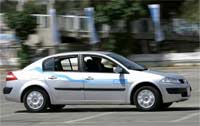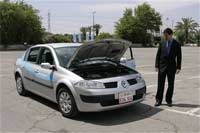Israelis got a first demonstration Sunday of the electric car that developers hope will revolutionize transportation in the country and serve as a pilot for the rest of the world.
The silver car doing circles in a Tel Aviv parking lot looked like a regular sedan - except it had no exhaust pipe and there was an electric socket where the mouth of the gas tank should have been.
The Silicon Valley startup Project Better Place hopes the fully electric prototype will be on Israel's streets in large numbers beginning at the end of 2010.
Backers of the project say the car will drastically reduce dependence on oil, cut emissions and put Israel at the forefront of international efforts to develop more environmentally friendly modes of transportation. Israel's government endorsed the project in January, and a Danish energy company also has joined as a partner.
But experts say technical pitfalls, such as a limited battery range, remain before the car will be marketable, and other car manufacturers are gambling on gas-electric hybrids as the green cars of the immediate future.
If the company's plan proceeds on schedule, Israel will be the first country to have electric cars on its highways in large numbers.
On the dashboard of the Renault sedan presented Sunday, the gas gauge was replaced by a screen showing how much battery power remained. In a test drive, the car accelerated quickly - the company says it can go from zero to 60 mph in eight seconds - and the engine remained nearly inaudible even at high speed.
The project is a joint venture between automotive giant Renault-Nissan, which is building the car, and Palo Alto, Calif.-based Project Better Place, which came up with the business model and is supposed to operate a recharging grid to be built across Israel beginning in 2009.
Several hundred cars are scheduled to hit Israel's streets in a pilot run next year, the company says, with larger numbers to arrive in late 2010.
The initiative is being led by Shai Agassi, an Israeli-American entrepreneur and high-tech wunderkind who raised $200 million to get the project off the ground. He also got Israel's government to endorse it earlier this year and promise tax incentives to promote the new vehicles when they go on the market.
At the time, experts said there are still plenty of technical pitfalls that need to be surmounted before the car becomes available to the general public.
Critics have pointed at the car battery's limited range - 125 miles - as a potentially major deterrent to consumers.
For long drives, motorists will be able to replace the battery at about 150 swap stations expected to be built around the country. The battery swap is expected to take the same amount of time as filling a tank of gas. For shorter journeys, drivers will be able to recharge the batteries at home or at the office.
Drivers will pay a monthly subscription for the batteries, with different plans like those of cell phone users. The company says the rates will come to less than the average monthly expenditure on gasoline.
Following Israel's lead, the Danish energy company DONG Energy AS adopted the Better Place model in March with a plan to have thousands of cars running on electricity generated by wind turbines by 2011.
If plans remain on schedule, Israeli consumers will be able to purchase an electric car by the end of 2010 for around the price of a regular sedan.

